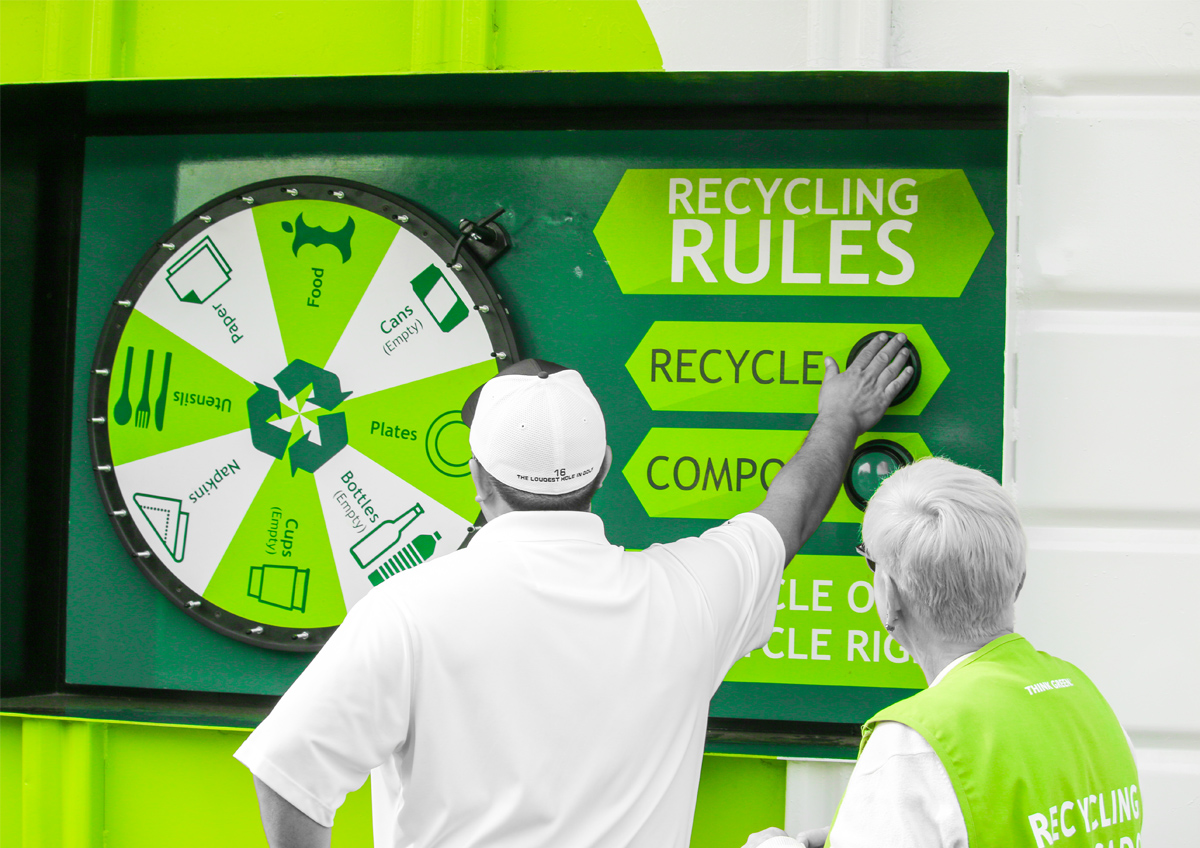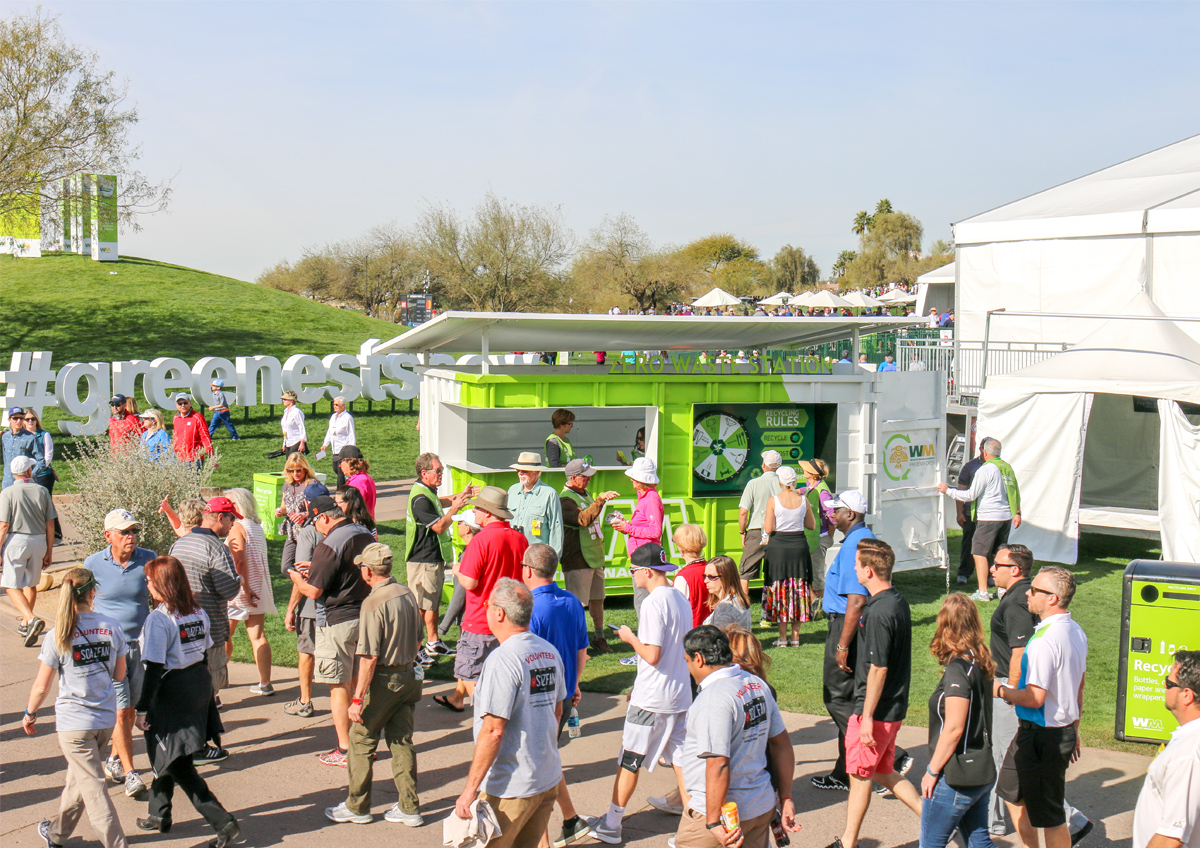
By Bharat Venkatesh
The Phoenix Open has long possessed the nickname “the Greatest Show on Grass” for its immense popularity and casual yet clamorous atmosphere that stands out from the other golf tournaments on the PGA Tour. Ever since Waste Management became the title sponsor in 2009, however, the Waste Management Phoenix Open (WMPO) has also earned the title of “The Greenest Show on Grass,” becoming a standard-bearer for sustainability in sports.
The Phoenix Open has a history of making the seemingly impossible possible, such as when Bob Goldwater defied those skeptical of a golf tournament in Phoenix; when The Thunderbirds went against expert opinion to move the venue to north Scottsdale; and when the tournament organizers disregarded critics and built a stadium around the 16th hole. Waste Management’s Zero Waste Challenge, which promised that zero waste would be sent to the landfill, was another goal that many decried as impossible — but the Phoenix Open once again achieved it against all the odds. In 2017, as with the last four tournaments, Waste Management successfully diverted 100 percent of the waste generated by over 655 thousand fans, players and sponsors from the landfill, repurposing it for beneficial use. To ensure that the initiative was successful, Waste Management worked with The Thunderbirds, sponsors and vendors to ensure that all event materials were compostable, recyclable, reusable or recoverable for energy.
“From a sustainability perspective, since 2013, Waste Management has diverted 100% of tournament waste away from landfills, through recycling, composting, donation, reuse or creating energy,” said Janette Micelli, Manager, External Communications, WM Corporate Communications. “The 2018 tournament will be no different as the Waste Management Phoenix Open will go for six Zero Waste tournaments in a row.”
 There were no trash receptacles at the WMPO — instead, only recycling and compost bins were present on the golf course. Waste Management continued utilizing three Zero Waste Stations, consisting of repurposed 40-cubic yard dumpsters “transformed into eyecatching kiosks where fans could drop off waste items with volunteers who sort the materials.” The limitation to two choices — recycling or composting — not only educates attendees about sustainability but also inspires attendees to implement such practices in their daily lives outside the tournament.
There were no trash receptacles at the WMPO — instead, only recycling and compost bins were present on the golf course. Waste Management continued utilizing three Zero Waste Stations, consisting of repurposed 40-cubic yard dumpsters “transformed into eyecatching kiosks where fans could drop off waste items with volunteers who sort the materials.” The limitation to two choices — recycling or composting — not only educates attendees about sustainability but also inspires attendees to implement such practices in their daily lives outside the tournament.
The waste diversion performance was calculated by measuring the different streams of waste leaving the venue. Of the waste material diverted from the landfill, approximately 50 percent was recycled, 34 percent was composted, 14 percent was converted to energy, and two percent was donated. Waste Management has worked with Underwriters Laboratories Environment Inc. since 2013 to validate the tournament’s diversion rate claims, achieving “Zero Waste to Landfill Operations with 13.9 percent incineration with energy recovery” this year.
To conserve water and ease pressure on the municipal water supply in the face of the tournament’s record-breaking attendance, the WMPO employs hand sanitizer at hand-washing stations, and the portable toilets at the venue use less water than conventional ones. Since 2011, Waste Management has also engaged in a greywater operation to reuse water from cooking and cleaning in portable toilets. The initiative has allowed reuse of over 31,000 gallons of water since then and 5775 gallons in this year alone.
The WMPO Campaign that started in 2015 has also restored over 161 million gallons of water to the Colorado River Basin and Verde River through Change the Course, a campaign to “to raise awareness about freshwater, reduce water footprints, and restore flows and health to vital freshwater ecosystems.”
The WMPO displayed 84,892 square feet of signage this year, almost 68 percent of which was reused from 2016 or earlier. Over 84 percent of the 2017 signage has been stored for potential reuse in 2018. Unused and perishable food from M Catering and Prom/Levy, totaling 18,450 pounds, was donated to local non-profit Waste Not, which disperses the food to various shelters. Additionally, 140,000 golf balls and 750,000 recycled-content golf tees in Waste Management’s two water features were reused for the tournament.
Waste Management worked with the Council for Responsible Sport, which supports socially and environmentally responsible event organizers and provides a two-year certification recognizing the successful completion of such a sporting event. The Waste Management Phoenix Open achieved Evergreen Inspire, the Council’s highest level of certification that is achieved only after achieving multiple prior certifications and thus demonstrating a long-term commitment to producing responsible events. It is also the first PGA Tour tournament and the largest event ever to achieve Inspire status.
 “The Waste Management Phoenix Open is the most sustainable sporting event in the world,” Micelli said. “The tournament is recognized as a leader in how to produce responsible sporting events, while also inspiring other events to improve their social and environmental performance.”
“The Waste Management Phoenix Open is the most sustainable sporting event in the world,” Micelli said. “The tournament is recognized as a leader in how to produce responsible sporting events, while also inspiring other events to improve their social and environmental performance.”
For the mentoring component of the Council’s Inspire program, the WMPO piloted the Golf Environment Organization (GEO) sustainable golf tournament standard at the 2017 tournament, providing feedback on credits and the documentation process. In 2017, the WMPO became the first GEO-Certified tournament.
To learn more about the Waste Management Phoenix Open, visit wmphoenixopen.com.
Bharat Venkatesh is a Tempe journalist who believes spreading awareness about the importance of sustainability should be part of every journalist’s ethical goal to seek the truth and report it.




